Today is Ukraine’s Independence Day commemorating its 1991 sovereignty from the Soviet Union. For me it has personal resonance.
In October 2023, I received a short email that filled me with dread.
“Sketches will be late. Missiles.”
For several months I had been working with Yana Holubiatnikova, an artist in Kherson, Ukraine, a city devastated by the seven-month Russian occupation in 2022, the destruction of Khakhovka dam, and the daily barrage of missiles and drones. I understood then that in Ukraine, survival was measured only by the day.
Once home to 300,000 people, Kherson saw 220,000 flee as refugees, many to Poland. About 80,000 stayed behind—whether by choice, necessity, or sheer refusal to leave. But numbers cannot convey what survival there means: the heartbreaking knowledge of children stolen, the discovered proximity of torture houses, the erosion of safety in every street.
“I haven’t moved anywhere, I’m staying in Kherson, working both at home and in the workshop,” she wrote after the occupation.
Long silences and reports of continued assaults on Ukraine became the daily context of our communication as we worked together conjuring the art for a children’s book.
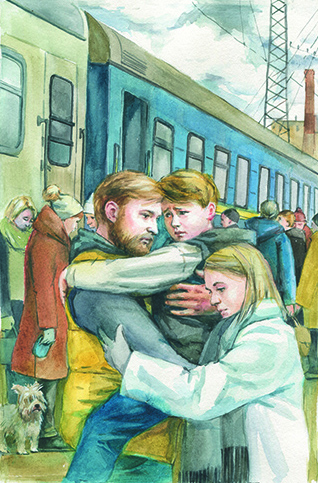 I came to know Yana that spring, after the Russian occupation ended, when I was contracted to design a children’s book raising awareness and support for Ukraine. As part of the agreement, I was to help select a Ukrainian artist to create more than a dozen color illustrations for the manuscript by Dr. Janice Cohn, a children’s book author and psychotherapist. Janice, a donor to the Ukraine Children’s Action Project (UCAP), contacted the organization’s co-founder, Dr. Irwin Redlener to see if they could recommend a Ukrainian artist. She was then put in touch with UCAP’s Regional Director, Yuliia Kardash, who spent many hours researching artists who might be suitable for the project, and finally recommended Yana. After reviewing Yana’s work, Janice and I agreed she was the perfect choice. Our correspondence began soon after.
I came to know Yana that spring, after the Russian occupation ended, when I was contracted to design a children’s book raising awareness and support for Ukraine. As part of the agreement, I was to help select a Ukrainian artist to create more than a dozen color illustrations for the manuscript by Dr. Janice Cohn, a children’s book author and psychotherapist. Janice, a donor to the Ukraine Children’s Action Project (UCAP), contacted the organization’s co-founder, Dr. Irwin Redlener to see if they could recommend a Ukrainian artist. She was then put in touch with UCAP’s Regional Director, Yuliia Kardash, who spent many hours researching artists who might be suitable for the project, and finally recommended Yana. After reviewing Yana’s work, Janice and I agreed she was the perfect choice. Our correspondence began soon after.
Early in our communication, Yana described painting as both her livelihood and her way of searching for meaning. Over the past year she had mounted three solo exhibitions—two in Kyiv and one in Nikolaev—while also contributing to group shows in Kyiv and Odessa. She often works on four canvases at once, drawing inspiration from masters such as Michelangelo, Velázquez, Toulouse-Lautrec, Modigliani, Fechin, Alma-Tadema, and Vermeer.

Yana Holubiatnikova
In one email, I asked Yana how she survived the Russian occupation. She emailed back only, “We did the things we loved”, which I assumed meant that painters painted, musicians played music and others spent time engaging with family. Because other questions went unanswered, we no longer talked about the war.
“When I go home and see a car with the inscription 300 (means killed soldiers or citizens), I understand at what price the number 11 (of November, when Kherson was unoccupied),” Yana wrote.
And so began a fourteen-month, on again/off again project that transformed Janice’s and my concern over illustrations into constant worry about the artist’s life.
In my experience, traditional book design, whether for publishing houses or self-publishers, usually requires only a modicum of consultations, two or three sets of proofs and a final approval. Working on what would become titled Freedom Pancakes for Ukraine became an unexpected project not only because of our communication difficulties and issues about sending payment to a Ukrainian citizen, but that I had immersed myself in the daily concern for one woman, her son, and a whole nation’s safety.
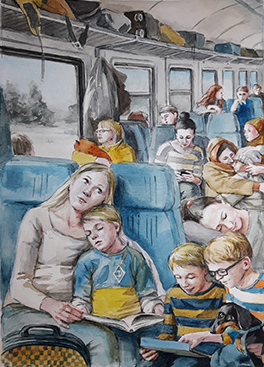 Since neither of us spoke the other’s language, Yana and I labored through a translation app to agree on how each illustration would appear using both her innate artistic intuition and scene requirements (complex positioning of multiple people, expression, etc.) on our part. And, for all I knew, despite cross-checking, a word in the Ukrainian app expressing “joy” could have been slang for “potato.” But she was kind, and rather than pointing out a translation problem simply asked for clarification. Some of the illustrations would take several more versions.
Since neither of us spoke the other’s language, Yana and I labored through a translation app to agree on how each illustration would appear using both her innate artistic intuition and scene requirements (complex positioning of multiple people, expression, etc.) on our part. And, for all I knew, despite cross-checking, a word in the Ukrainian app expressing “joy” could have been slang for “potato.” But she was kind, and rather than pointing out a translation problem simply asked for clarification. Some of the illustrations would take several more versions.
Another surprise at the front-end of the project was that Yana would be using watercolors instead of oils or other medium we had seen in her work. Watercolors are notoriously difficult or impossible to revise or modify, but despite this, we saw that her watercolor work displayed a sense of vibrancy that evoked more hope than the despair of war, fitting since the book was about acts of kindness, not the suffering of war, although that tone was always in the background. Also, watercolors dried faster, and Yana could handle them to transport them for scanning in Kherson.
Still, sometimes we wouldn’t hear from her for more than two weeks, all of us surmising the worst outcome as we searched through Ukrainian news sources for reports of heavy strikes in the Kherson region. Then:
“The entire area along the river is under fire. In the area where I live, shells arrive, but rarely. A big problem for people is hunting them with drones. There are few people in the city. Shops, hospitals, police, volunteer centers are open.”
…
When Russia’s invasion of Ukraine began in 2022, Janice felt the same helplessness many of us did—yet she chose to answer her anguish by writing a children’s book. Janice turned to what she knows best: stories that heal. She is the author of several acclaimed children’s books, including The Christmas Menorahs: How a Town Fought Hate, the true story of a Montana community standing together against bigotry and hate. She has also written Why Did It Happen? Helping Children Cope in a Violent World and other works that center on compassion, resilience, and moral courage.
“When the war in Ukraine began, I grappled with my own sense of helplessness. I thought of the Ukrainian children caught up in the war, and American children and how they’re affected by a world with so much violence,” Janice said,
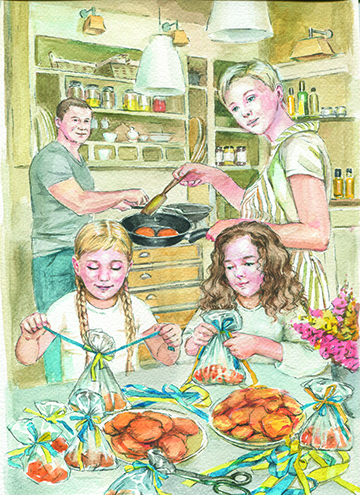 Janice’s new narrative grew out of her “conviction that kindness and compassion can steady children in even the darkest times, and that in helping others, we often find our own resilience.” The book became a parallel story about two children, a boy, Artem, escaping Ukraine with his mother, and a girl, Hannah, in America who became determined to raise funds for the war-torn country. Chapters became counterpoint narratives about each child’s experience.
Janice’s new narrative grew out of her “conviction that kindness and compassion can steady children in even the darkest times, and that in helping others, we often find our own resilience.” The book became a parallel story about two children, a boy, Artem, escaping Ukraine with his mother, and a girl, Hannah, in America who became determined to raise funds for the war-torn country. Chapters became counterpoint narratives about each child’s experience.
Janice’s friend, Merrill Silver, a writer and English as a Second Language (ESL) teacher, who taught a number of Ukrainian refugees, introduced her to Paolo Volpati-Kedra, who volunteered with World Central Kitchen, at the beginning of the war, to help feed the Ukrainian refugees (mainly women and children) who were pouring into Poland.
He vividly described to Janice his experiences and observations with mothers and children at the Welcoming Center where he was stationed, which provided food, succor and kindness to the often traumatized refugees.
Janice and Merrill also came up with the idea of a favored Ukrainian dish—potato pancakes, “deruny”, to become the central metaphor for Hannah’s fundraising sale, echoed by a moment with Artem at World Central Kitchen when Chef Paolo reaches out to show kindness to the boy.
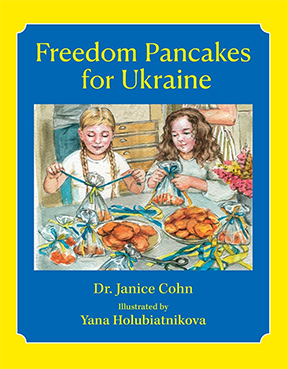 For Janice, the book became more than a story—it became a reminder that even small acts of care can repair the world. Yana eventually received some copies of the book.
For Janice, the book became more than a story—it became a reminder that even small acts of care can repair the world. Yana eventually received some copies of the book.
After the book was published under Janice’s imprint, Le Chambon Press, named to honor the town in the south of France that saved hundreds of Jewish children and adults from the Nazis in occupied France during World War Two, our communication with Yana continued to be sporadic.
In early June, after receiving the books, Yana wrote:
“I received the books. I wanted to make a video with words of gratitude, but I didn’t have time, these days are very difficult for me. After a strong shelling my rabbit was concussed, he doesn’t move, I’m treating him. And there were other problems. I am very grateful to you.”
We were dismayed by the news. The rabbit had been her companion throughout the war. Six weeks later, a brief message arrived: “I am ok. My rabbit lived.” For Yana, survival is counted in such moments. And now her work, Freedom Pancakes for Ukraine, makes its way to children across the globe as a reminder that even in desperate times, kindness endures.
To find out more about the book, go here.
For more about Ukraine Children;s action Project, go here
For more about World Central Kitchen, go here.
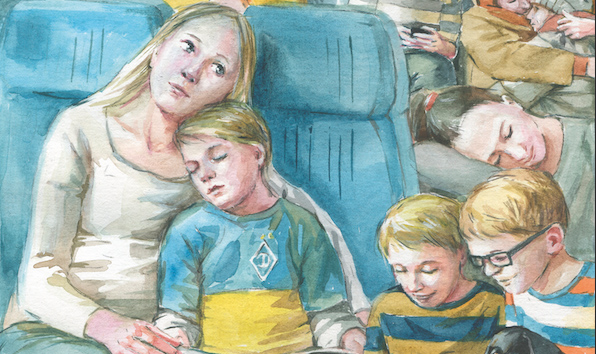


Write a Letter to the Editor on this Article
We encourage readers to offer their point of view on this article by submitting the following form. Editing is sometimes necessary and is done at the discretion of the editorial staff.